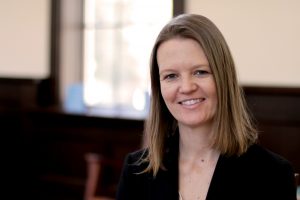
Assistant Professor / Director of Digital Literacy and Communications Lab
2012, Ph.D., University of California, Santa Cruz
Bio
Courtney Rivard, Ph.D. is the Director of the Digital Literacy and Communications (DLC) Lab and Assistant Professor in English & Comparative Literature at the University of North Carolina, Chapel Hill. The DLC serves as a hub for innovation in the humanities that focuses on digital literacy, public humanities, digital humanities, and critical game studies. Her research is at the intersection of Rhetoric & Composition and Digital Humanities.
Dr. Rivard’s scholarship, teaching, and administrative service all share a commitment to developing interdisciplinary collaborative approaches that center humanistic inquiry alongside computational methods. She is interested in how the information infrastructure of archives create arguments regarding race, gender, class, and national belonging. More specifically, her scholarship is motivated by questions such as how do the information infrastructure of archives and digital collections create arguments regarding race, gender, class, and national belonging? How can interdisciplinary methods that combine close textual analysis and computational analysis be used to address silences in archival records? And how can scholars imagine new forms of scholarship that leverage the potential of digital modalities to reach wider audiences?
Her first book, Layered Lives: Race and Representation in the Southern Life History Project (Stanford University Press, 2022), combines archival and quantitive methods to recover the history of the Southern Life Histories Project part of the Federal Writers’ Project during the 1930s. This innovative digital book demonstrates how gender and race informed the writing practices used to create the concept of “life histories,” which documented the lives of Southerners struggling to survive the Great Depression. This project was made possible by an American Council of Learned Societies (ACLS) Digital Extension Grant and an Institute for the Arts & Humanities at UNC faculty fellowship. Additionally, her work can be found in College Composition and Communication, Rhetoric Review, and Digital Humanities Quarterly.
As Director of the DLC, Dr. Rivard has begun a new research area in critical game studies to explore how theories of play and gaming can help create critical pedagogies that interrogate race, gender and sexuality as well demonstrate how algorithmic rhetoric shapes narrative structures. Recently, she received a NEH grant to create a Critical Gaming Initiative that centers questions of identity and representation in the development of a Critical Game Studies minor. The cornerstone of the initiative is the Greenlaw Gameroom, UNC’s first game-based classroom, funded by a Lenovo Instructional Innovation Grant.
To read more, visit my websitePublications:
-
Layered Lives: Rhetoric and Representation in the Southern Life History Project, Stanford University Press, (2022)
- “The Rhetorical Power of Archives: The Federal Writers’ Project, Wikipedia, and First-year Composition.” Teaching Rhetoric and Composition through the Archives. Eds. Wendy Hayden and Tarez Samra Graban Southern Illinois Press. (2022)
- “Turning Archives into Data: Archival Rhetorics and Digital Literacy in the Composition Classroom,” College Composition and Communication (June, 2019)
- “Collaboration, Teaching, and Interpretation: Making Data Construction Visible” with Lauren Tilton and Taylor Arnold for publication in DH Quarterly. (2019)
- “Decolonizing Projects: Creating Pluriversal Possibilities in Rhetoric.” With Ellen Cushman, et. al. Rhetoric Review. 38.1 (2019)
- “Archival Recognition: The Pointe-au-Chien’s and Isle de Jean Charles Band of the Biloxi-Chitmacha Confederation of Muskogees’ Fight for Federal Recognition.” Settler Colonial Studies. (2015)
- “Introduction: Indigeneity and the work of settler archives.” Co-written with Adams-Campbell and Ashley Glassburn Falzetti. Settler Colonial Studies. (2015)
- “Archiving Disaster and National Identity in the Digital Realm: The September 11 Digital Archive and the Hurricane Digital Memory Bank” in Identity Technologies: Producing Online Selves. Eds. Julie Rak and Anna Poletti. University of Wisconsin Press. (2014)
Awards
- 2023 Academic Leadership Program Fellowship from Institute for the Arts & Humanities, UNC-Chapel Hill
- 2023 UNC Global Partnership Award for collaboration with Eberhard Karls Universität, Tübingen, Germany
- 2022 Humanities for the Public Good, UNC-Chapel Hill for “Forever Chemicals in North Carolina: A Story Archive” designed to collect oral history interviews with North Carolinians who believe they have been affected by PFAS.
- 2022, Humanities for the Public Good, UNC-Chapel Hill for a collaborative project with the Jackson Center, a hub of creative action dedicated to preserving the history of Black neighborhoods in Chapel Hill and Carrboro, NC.
- 2022 Humanities Initiative Grant from the National Endowment for the Humanities
- 2022 Schwab Academic Excellence Award from the Institute for the Arts and Humanities at UNC
- 2021 UNC Center for Faculty Excellence/Lenovo Instructional Innovation Supplementals Grant
- 2021 Global Partnership Award from UNC Global for collaboration with Universität Tübingen
- 2021 Institute for Arts and Humanities Faculty Fellow
- 2019 UNC Center for Faculty Excellence – Lenovo Instructional Innovation Grant
- 2016 ACLS Digital Extension Grant
- 2016 Data@Carolina Course Development Grant
Courses Taught:
- ENGL105
- ENGL 113: Data as Rhetoric
- ENGL 114: Introduction to Critical Game Studies
- ENGL 118: Storytelling and Game Development
- ENGL149: Digital Composition
- ENGL 318: Multimedia Composition
- ENGL 482: Rhetoric and Digital Humanities
- ENGL 709: Introduction to Digital Humanities

